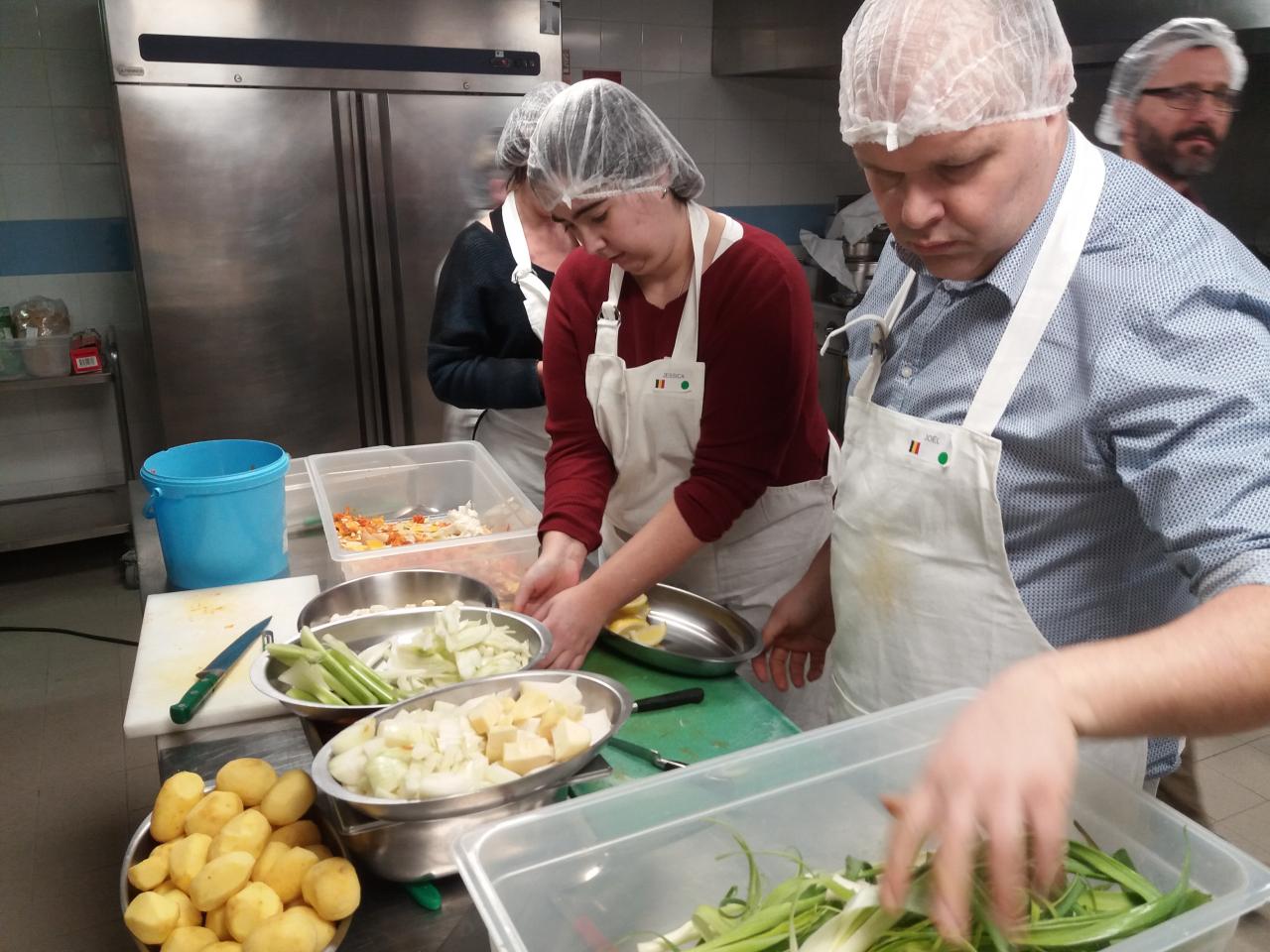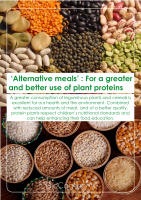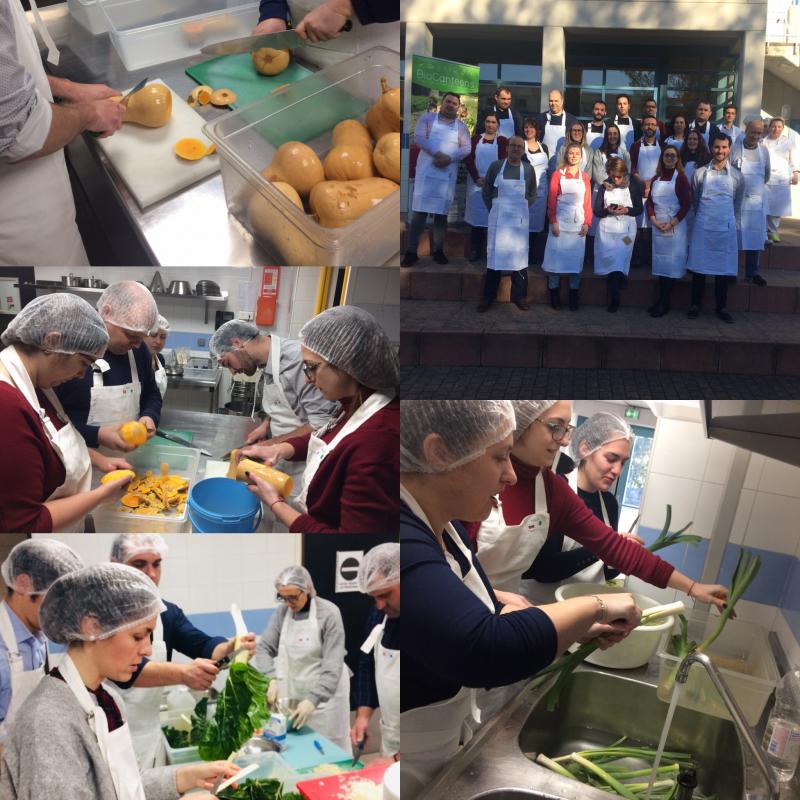
BioCanteens partners had a lot on their plate for their first transnational meeting on sustainable school kitchens from the 30th of January to the 1st of February 2019: how to help partner cities in significantly improving the sustainability of local school kitchens that serve up to thousands of meals on a daily-basis and which organisation is complex and based on deeply-rooted practices? Here is how BioCanteens partners did it.
Sustainable school kitchens at the core of Mouans-Sartoux’s good practice
BioCanteens’ first transnational meeting focused on Mouans-Sartoux’s good practice in the field of sustainable school catering recognised at European level notably based on the daily distribution of school meals that are 100% organic.
Although Mouans-Sartoux’s Good Practice is characterised by a well-integrated ecosystem, the city’s achievement in the field of sustainable school catering has been built thanks to a rather incremental approach and the ‘step by step’ optimisation of kitchen processes. Mouans-Kitchen’s staff and management have therefore collected over time several ‘kitchen micro-good practices’ that could be readily shared with BioCanteens partners.
Kitchen micro-good practices as “quick wins”
The 7 partner cities’ kitchen chefs and canteen managers came to Mouans-Sartoux to specifically work and exchange on good practices implemented in school kitchens.
These kitchen micro-good practices are tiny actions that are easy and/or light to implement in school kitchens but which have immediate positive effects on the sustainability of the cooking process and meals distribution, thereby ensuring a “quick-win” for kitchen staff and management.
Mouans-Sartoux’s kitchen micro-good practices include inter alia the following examples:
• Setting-up a food waste sorting line: Children play an active role in sorting out food leftovers, which are then monitored and weighed on a daily basis in order to adapt menus and ensure significant food waste reduction.
• Adapting portion sizes to children’s appetite: Portions of different sizes are served to children according to their appetite so as to ensure everything is eaten with minimised food waste.
• "Alternative meals" for a greater and better use of plant proteins: A greater consumption of leguminous plants and cereals is excellent for our health and the environment. Combined with reduced amounts of meat, and of a better quality, protein plants respect children’s nutritional standards.

These tiny actions aim to encourage and incentivise partner municipalities to implement such sustainable practices by showing them that achieving sustainable school kitchens is a matter of progressive changes that are easy to put in place and prove highly rewarding.
Fruitful collective cooking session
The transnational meeting was organised around some field visits to Mouans-Sartoux’s school canteens and a technical hands-on session to showcase how these kitchen micro-good practices have been implemented in the southern French city. In particular, one of the highlights of the meeting was a collective cooking session at François Jacob Primary School kitchen during which all partners prepared altogether their dinner. This practical session, taking place in a relaxed atmosphere, enabled the local chefs to share their views and experiences with partners on how these practices changed their way of working and explained how they continuously try to improve them.
In return, Mouans-Sartoux’s chefs and kitchen manager also learned a lot from their counterparts, and discovered some new cooking habits that could help further improve their owns. Tayeb Nemri, Mouans-Sartoux’s kitchen manager, underlined that “one afternoon with the European partners is better than 3 days of our usual trainings, because it brings us a totally different point of view”, showing that the exchanges headed on both directions.

The collective cooking session included the preparation of traditional recipes from partner countries. Participants could treat themselves with tantalising dishes including amongst others a chicken Waterzooï with winter vegetables from Belgium, vegetables pataniscas from Portugal as well as sweet pumpkin for dessert from Bulgaria. This joyful cooking afternoon followed by a shared meal was also an excellent way to reinforce human bonds between all project partners!
“We all have kitchen micro-good practices to share!”
Although most of the kitchen micro-good practices covered during the meeting were based on Mouans-Sartoux’s good practice, all cities shared their own experience. Indeed, all partners had to identify prior to the meeting several micro-good practices that they already implemented in their local school kitchens with a view to sharing them with BioCanteens partners. This exercise partly aimed to help them realising that they already have some sustainable practices put in place, although unnoticed or considered as normal. As Giuseppe Schiavone (local coordinator in Rosignano-Marittimo) pointed out “some micro-good practices that might seem usual for us are not necessarily for the other partners”.
The discussions and working sessions of this transnational meeting led to the preparation of a catalogue of the best BioCanteens kitchen micro-good practices, as part of the project deliverables. This catalogue aims to help project partners to implement as many MGPs as possible at local level throughout the duration of the network, but it could also be used by external municipalities willing to improve the sustainability of their school kitchens.
After two and half days of intensive work, all partners came back home with new ideas and the willingness to implement several practices identified during the meeting in their own canteens. A regular monitoring will be ensured throughout the project in order to assess and validate the expected benefits for project partners, especially in terms of food waste reduction.
We would like to here from you!
According to you, what are the kitchen micro-good practices in your city’s collective kitchens? What could you do better?
Let us know your thoughts on:
- Twitter @BCanteens
- Facebook BioCanteens

